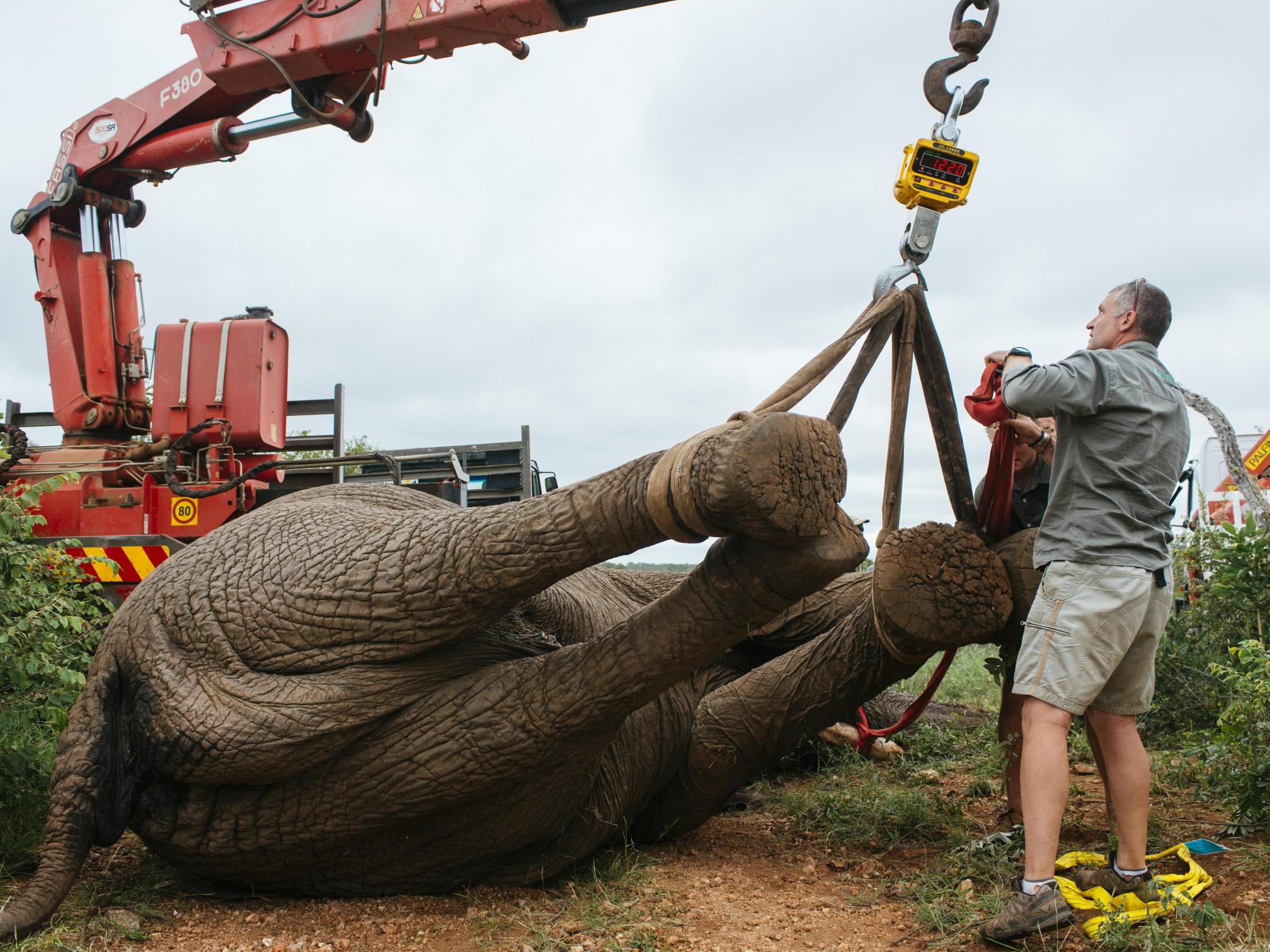Elephant at risk of being legally shot dead if he keeps going home
'If Riff Raff is killed it will be a tragedy, not only on an individual scale, but for so-called problem elephants nationally'
He has fathered more babies than most and will go on to help save his species for future generations – if he is allowed to live.
Riff Raff – a bull elephant who weighs in at 6.5 tonnes (1,020st) – is in danger of being shot dead by villagers in the South African province of Limpopo, who have branded him a “nuisance” for raiding their crops.
Until now he has thwarted all rescue efforts as part of a giant operation to move him to a new reserve, which failed because he packed his trunk and simply marched home again.
Now the race to save Riff Raff’s life is on again, as conservationists hope to move him to a third reserve much further away.
If they succeed, he would have the almost-impossible task of crossing mountains and motorways to get home.
“There, he will be the oldest, most dominant bull in a much larger reserve with many new, unrelated females. This is utopia for a bull elephant wanting to mate,” said Audrey Delsink, executive director of Humane Society International (HSI) Africa, one of three groups preparing for the big removal.
The operation to move him could cost up to £7,000 and will involve a helicopter, a special lifting crane, tranquillisers and giant crates, along with crews of experts including a vet.
The 45-year-old animal has lived at a 50,000-acre park in Limpopo province all his life and has been monitored for 18 years.
But in recent months farmers have complained about him trampling down fences and helping himself to crops. As a result they are threatening to shoot him.
It’s not the fault of these amazing creatures that humans want to share their land, so we have to find non-lethal solutions
“If he stays in Limpopo he’ll almost certainly be killed,” Ms Delsink said. “If Riff Raff is killed it will be a tragedy, not only on an individual scale, but for so-called problem elephants nationally. At 45, he is a prime bull. As a mature, musth [mating time] bull, he will be the females’ first choice when it comes to mate selection, so will definitely be siring offspring for many years to come.”
Riff Raff – who is at the top of his herd’s hierarchy – symbolises the growing problem of conflict between humans and wildlife over land in Africa – the result of human population expansion leading to people and animals sharing increasingly scarce habitat and resources.
“It’s not the fault of these amazing creatures that humans want to share their land, so we have to find non-lethal solutions to this as part of national strategy,” said Ms Delsink. “It’s a problem that South Africa’s wildlife faces time and again as man-made fences prevent natural migration, especially in times of drought. Simply killing wildlife who get in our way is not the answer.”
South Africa’s 24,000 elephants all live in protected private reserves and national parks, but as males grow older, when they stray from their herds in search of new territory and new females, they can sometimes destroy the fences they encounter.
Repeat fence-breachers such as Riff Raff are often killed. In 2016-17 up to 50 destruction permits were issued in South Africa for “problem” elephants.
Earlier this year, HSI, Elephants Alive and Global Supplies teamed up to move Riff Raff away. After tranquillising him, they lifted him into a crate and moved him to the Olifants River Game Reserve in Balule – but in less than 48 hours he had walked straight back home.
“Now we are planning a second relocation effort, but these are very tense times. His life is hanging in the balance right now. He could be shot as a ‘nuisance’ elephant,” said Ms Delsink.
The conservationists are having to liaise with authorities to obtain a permit before a date can be set for the move to a new reserve. One they have in mind is at least 270 miles away and is 30,000 acres bigger than the first one.
“Our hope is that we can buy him some time on this reserve by getting permission to strengthen the perimeter elephant-proof fence and mitigate fence-breaching behaviour while we finalise the new reserve, which is further away and where he will have another chance to settle down," Ms Delsink added. “Relocations of single bull elephants this size are a mammoth undertaking. A large ground crew of about 10 people, two vets, a pilot and truck drivers are needed – up to 25 people.
“The equipment is specialised and only a few capture operators have it.”

When the crane trucks, recovery trucks and transport box are all in place, the helicopter will search for Riff Raff, who has been fitted with a radio collar, she said.
“Once located, the vet will immobilise him and the ground crew and trucks move in to load the sedated animal,” she added. “He then is taken to the transport box and woken up before he is driven to the new reserve. “Using a special crane and scale, we saw that Riff Raff weighs 6,480kg so you can imagine how strong the equipment needs to be.”
The wildlife experts predict he will settle in by exploring his new territory and its boundaries to familiarise himself with his new home.
“Given the distances between the two reserves and the obstacles, he will not be able to simply walk back,” Ms Delsink said. “Moving him gives him a second chance – but we have no guarantees of a successful outcome. We have all the ingredients for an amazing elephant protected area. We just have to hope that he feels the same way.”
Join our commenting forum
Join thought-provoking conversations, follow other Independent readers and see their replies
Comments
Bookmark popover
Removed from bookmarks